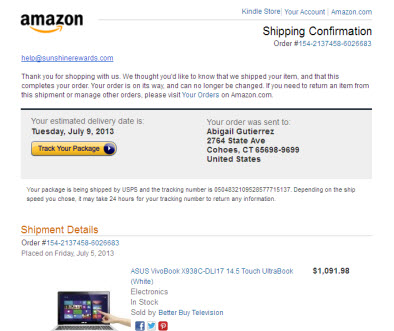 Once again my inbox has been filled with a bunch of spammy, fake Amazon shipping emails. I know not to click on anything in them, but I am worried that a lot of others do not. In fact, the very first time I received one of these it completely freaked me out because it looked so much like an actual Amazon shipping confirmation (and I get a LOT of those!). I immediately assumed that my Amazon account had been hacked and someone was ordering through my account. I may have even (gulp) clicked on it in my moment of panic.
Once again my inbox has been filled with a bunch of spammy, fake Amazon shipping emails. I know not to click on anything in them, but I am worried that a lot of others do not. In fact, the very first time I received one of these it completely freaked me out because it looked so much like an actual Amazon shipping confirmation (and I get a LOT of those!). I immediately assumed that my Amazon account had been hacked and someone was ordering through my account. I may have even (gulp) clicked on it in my moment of panic.
What Are These Emails?
These fake emails look pretty much identical to Amazon confirmations. That’s how they get people to click on them. They may even come to the email address that you use for your Amazon account, although most of mine go to other email addresses that I have used for newsletter and contest signups, in addition to the “contact us” email address on my business pages.
The point of the emails is to get you to click either in a panic about your account or just out of curiosity to see where the email came from. If you hover over any of the links in the email, you will see that they do NOT go to Amazon but rather something spammy. When you click on that spammy link, any number of bad things can happen to your computer depending on who sent the email. Chances are good that they are trying to install some type of malware (bad stuff) onto your computer.
Here’s a copy of an email that I just received (one of many this week already):
What Should You Do If You Get One?
First, don’t freak out. It does not mean that any of your account information has been compromised. Someone just got your email address and sold it. This happens ALL the time. Second, do not click on the links. If you are really worried about your Amazon account, go to Amazon.com and log in and look at the purchases in there. Third, report the email as spam using your spam button (which is different in every email). It won’t really help with this email, but it may send all future emails to your spam folder, where you will not be tempted to click on them.
What if you already clicked on the links? The odds are that your spyware program stopped you from going any further. If you do not have an anti-virus program on your computer, I suggest that you get one ASAP (I like AVG Free Antivirus). If you did nothing but click on a link and your computer was NOT protected, download anti-virus software now and run it to catch anything that might have been installed. If you clicked on a link and proceeded to a site where you entered ANY personal information (as minor as a password, as major as credit card or social security numbers), you need to take further action such as changing your passwords on all accounts, watching your credit card carefully for purchases, or even signing up for a service like LifeLock (30 day free trial) to monitor your personal information.
Hopefully you were not fooled by these emails, but they are a good reminder of what might be lurking out there in our inboxes. Always be vigilant with emails you receive to verify where they came from before taking any type of action that might compromise your identity, accounts, or computer.


I had two of these fake Amazon emails this morning. One said my new Samsung Chromebook had shipped and the second just said “your order” …. between these and fake Paypal emails I’ve become email link paranoid, I almost never click on anything in any email anymore.
I forgot about the Paypal ones! I have gotten those as well!